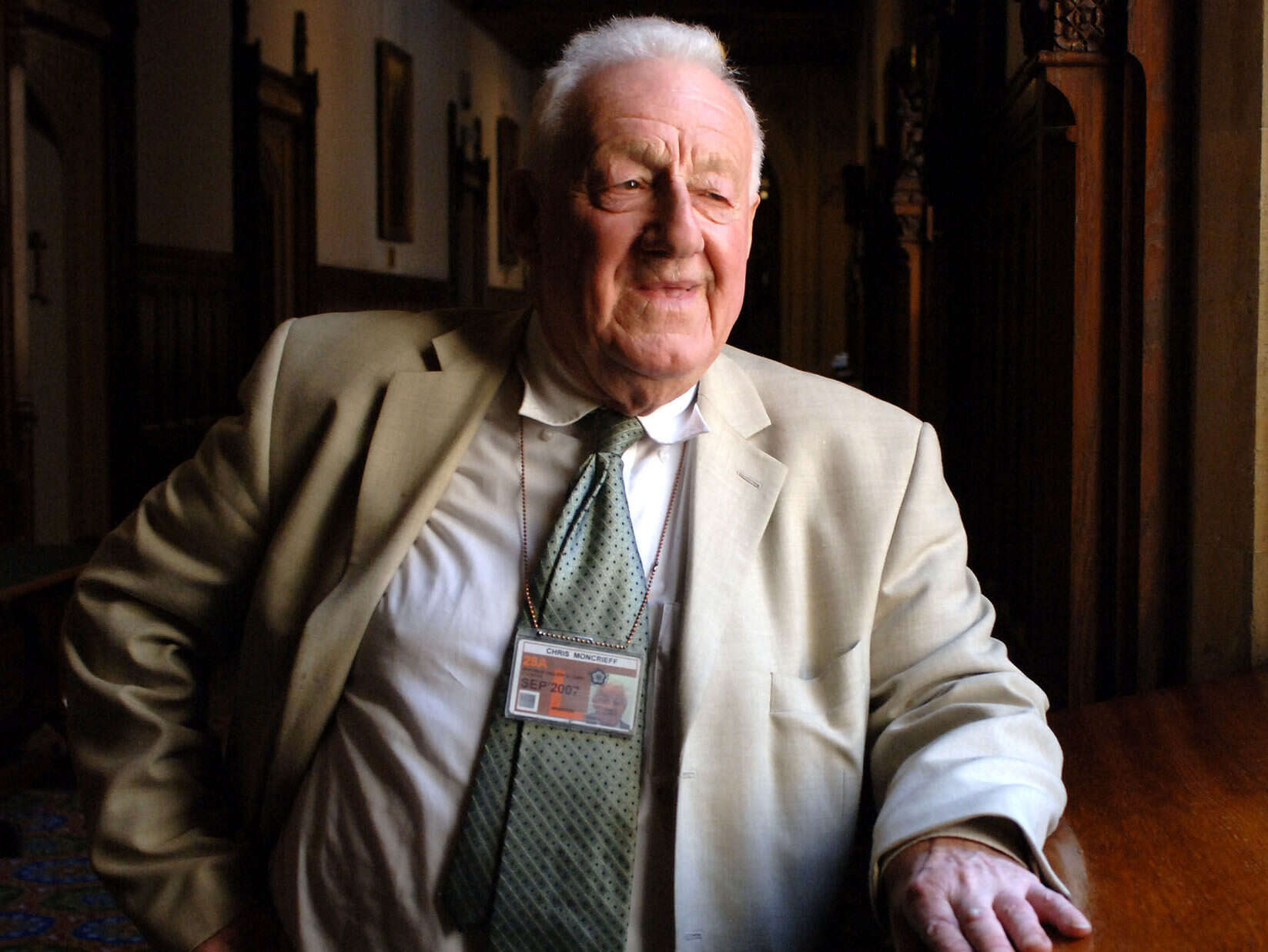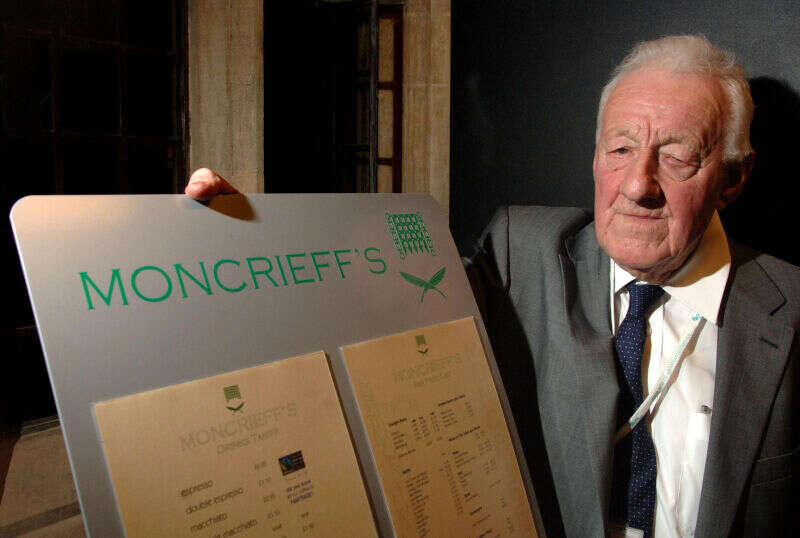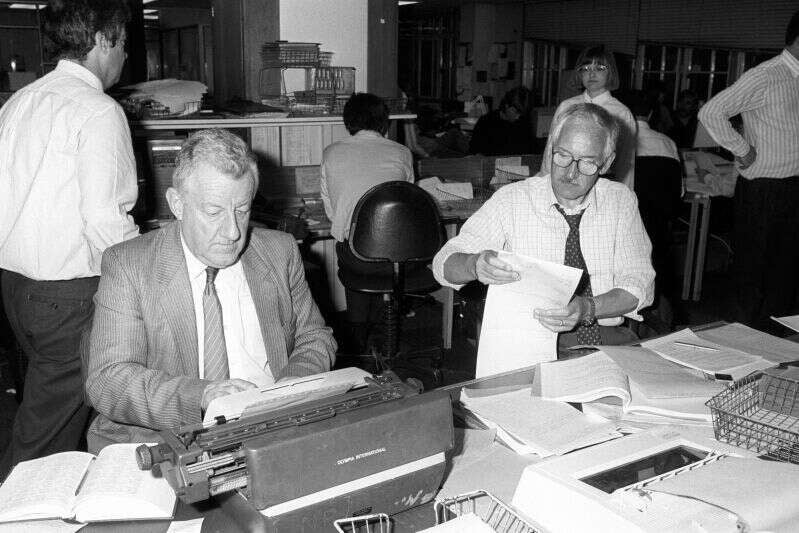
Chris Moncrieff, one of the most respected lobby journalists of his generation, has died aged 88.
The former political editor of PA, who was hailed as “the one journalist who mattered” by former Prime Minister Tony Blair, died in hospital this morning after a short illness, his family said.
He retired after 32 years at Westminster in 1994 but returned to work the next day and continued to contribute to the agency until his death.
Pete Clifton, PA’s editor-in-chief, said: “Moncrieff was the ultimate news agency journalist – great contacts, always close to the action, working some epic hours and obsessed by getting stories out before everyone else.
“He had no interest in any political agenda or viewpoint, just making sure he was first to write about it.
“On the rare occasion he took a holiday, we could expect him to file news stories he’d picked up on the promenade, and until very recently he was still filing us the ‘quotes of the day’ feature for the newswire, as well as drawing on his extraordinary memory to file a weekly politics column for our regional newspaper subscribers.
“Legend gets overused, but there’s no doubt Moncrieff was a PA legend and a remarkable political reporter.
“We are profoundly sad today, but cheered by the many stories of Moncrieff we can share.”
Described in Westminster as “the man with the lived-in face and slept-in suit”, Moncrieff’s style was classic news reporting and he roamed Westminster with order papers stuffed under his arm and notebooks in his pockets as he encouraged MPs to call him at any time of day or night.
He joined the national news agency’s parliamentary staff in 1962 before becoming a lobby reporter in 1973 and chief political correspondent (later political editor) in 1980.
Westminster’s The House magazine said he was a “one-man dynamo for whom news is food and drink is Guinness”.
The press bar of the House of Commons was named after him in 2007.

Press Association political correspondent Chris Moncrieff standing with the menu board at the official opening of Moncrieff’s, a bar and restaurant in the press gallery of the Houses of Parliament, London, which was named in his honour in 2007. Picture: Clara Molden/PA Wire
Moncrieff had other Prime Ministers as admirers, with Margaret Thatcher appointing him a CBE in the 1989 New Year Honours.
And Sir John Major once declared him to be a “national treasure” to bemused Chinese Government officials on the Great Wall of China after the PM saved him from falling on a steep slope.
Sir John later recalled: “Moncrieff emerged from the mist hurtling downhill.
“His feet were out of control in the way his pen never is. He headed irresistibly towards the edge of the Great Wall and the drop over the side.
“I put out my arm to steady him and the great man was preserved for posterity.”
Moncrieff’s file of cuttings in the pre-internet PA news library was fatter than that of many of the figures he had written about.
He would begin filing political stories to PA from his home around 7am, arrive at Westminster soon afterwards, cover the day’s most important political stories plus a few light-hearted ones and seldom leave for home before the last few MPs.
Accuracy, speed and balance – the PA imperatives – were sacred to him. An immaculate shorthand note meant his accuracy was never successfully challenged.
His speed at rapping out a PA news alert with the bare bones of a major story, followed immediately by the full version, often put the agency vital seconds ahead of rivals, with the PA story reaching newspaper offices before their own reporters had started filing.
MPs were keen to oblige as his assistants: he was way ahead of rivals on the leadership ballot which led to Margaret Thatcher’s overthrow because a Labour MP was holding the nearest phone open to his newsdesk.
His style was classic news reporting: the most important fact and best quotes in the first few paragraphs, the details stated clearly and simply, quotes in direct speech and any interpretation clearly defined.
Even his closest colleagues never knew Moncrieff’s own political views – he would probably have cast his vote for the candidate or party which provided the best stories – while he was unfailingly courteous.
“I like to give the impression I agree with everyone,” he said.
“I don’t think you get the best out of people by asking them hard questions – all I want is to get the stories out.”
Tatler, the magazine for society’s dedicated followers of fashion, turned its attention to Moncrieff in 1985, describing him as “the man who launches a thousand stories”.
“It’s old-fashioned journalism… Nothing is concealed in the trendy jargon of the pseudo-sophisticated Lobby correspondent,” it read.
“He writes down words and sends them off down the wire, unconcerned with making great judgments. In an age of commentators, he is a reporter.”

File photo dated 5 June 1987 of Chris Moncrieff (left) working in the Press Association’s Fleet Street office with Associate Editor Reg Evans (right) on Election Night. Picture: PA Wire
Moncrieff was born on 9 September 1931. He decided on a career as a journalist when other small boys were dreaming of being engine drivers.
He spent a frustrating spell in a London solicitor’s office before he landed his first job on the local paper in Harrogate.
After National Service as a lance-corporal in the Intelligence Corps he worked on the Coventry Evening Telegraph and the Nottingham Evening Post.
He spent some time in France working at a fairground in Paris, a factory in Lyon and as a part-time English teacher.
He joined the PA Parliamentary staff in 1962. A year later he was sent to cover the Great Train robbery.
Such was his dedication to the story that when police appealed for information about anyone who had gone missing around the time of the heist, his name was proffered by a neighbour.
He had four children with his late wife Margaret.
Picture: Clara Molden/PA Wire
Email pged@pressgazette.co.uk to point out mistakes, provide story tips or send in a letter for publication on our "Letters Page" blog
